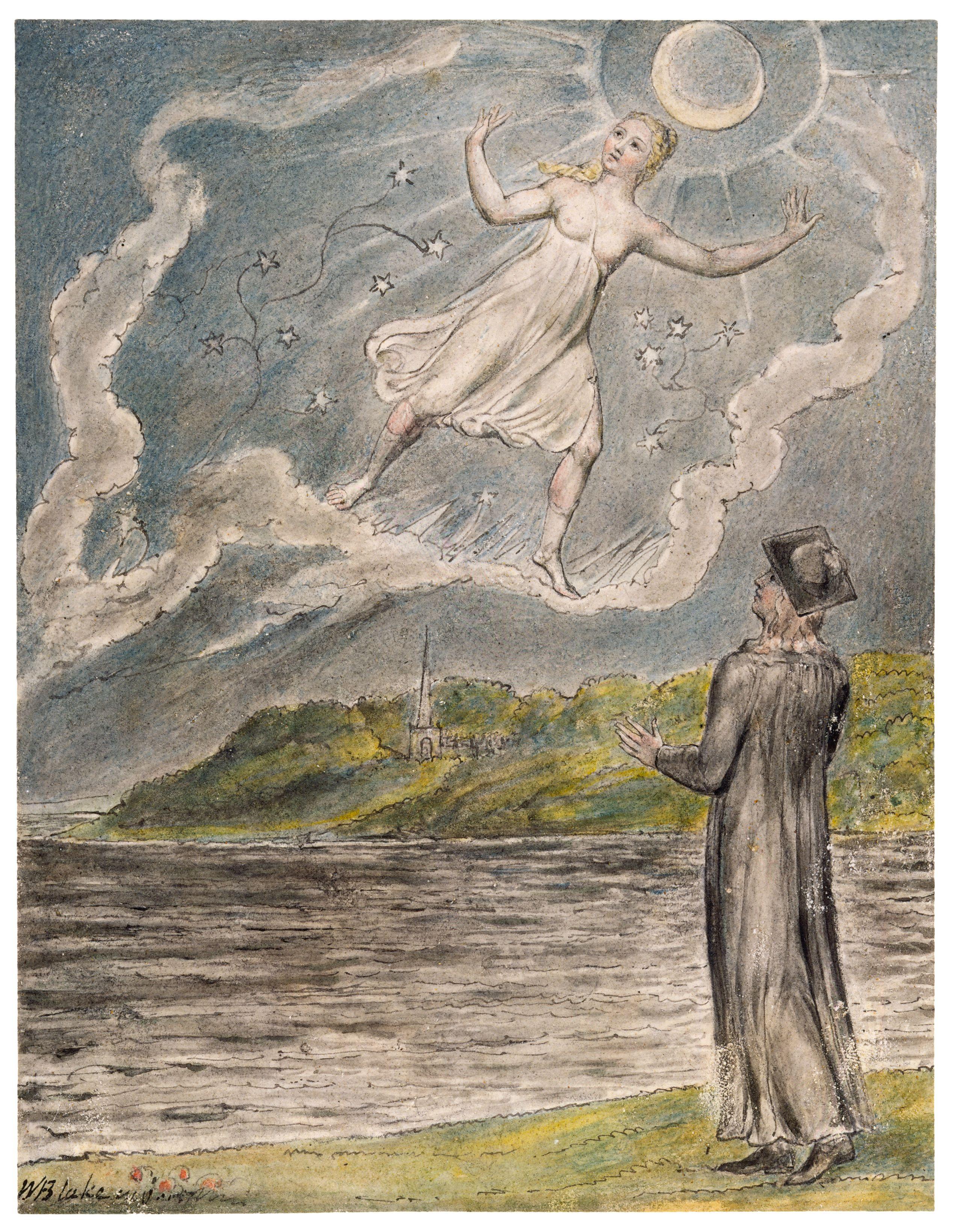Descriptions of Illustrations to Milton's L'Allegro and Il Penseroso (E 684)
"To behold the wandring Moon
Riding near her highest Noon
Like one that has been led astray
Thro the heavens wide pathless way
And oft as if her head she bowd
Stooping thro' a fleecy Cloud
Oft on a plat of rising ground
I hear the far off Curfew sound
Over some wide waterd shore
Swinging slow with sullen roar"
Blake wrote:
"Milton in his Character of a Student at Cambridge. Sees the Moon terrified as one led astray in the midst of her path thro heaven. The distant Steeple seen across a wide water indicates the Sound of the Curfew Bell"
Blake does more than illustrate Milton's lines in his second image for Il Penseroso. Milton's reference to the moon gives Blake an opening to begin commenting visually on one of the fundamental divisions in his system - the division between male and female. The active principle represented by the sun is the male. The receptive principle, the moon which reflects the sun's light, is the female. In Eternity the male and female are not divided. They become divided when the female seeks repose in Beulah.
The female figure in this illustration is the moon, just as the male figure in illustration three of L'Allegro is the sun. Blake humanises the moon and the sun whereas in the first illustration he personified the various aspects of melancholy. The eternal reality occupies the top of the picture; the natural world is seen at the bottom. The state of melancholy is here portrayed as the state of repose in which there is a withdrawal from the active mental pursuits into materiality where eternity is forgotten.
Since Blake portrayed Milton in the natural world as a student at Cambridge, he is indicating that Milton's studies, his academic pursuits, drew him away from his imagination, his connection with the eternal, and into the moony, feminine, material world.
When we read the role Beulah played in Blake's scheme of thought we can better understand why Milton 'Sees the Moon terrified as one led astray in the midst of her path thro heaven.'
Songs of Innocence & of Experience, Song 16, (E 11)
"A CRADLE SONG
Sweet dreams form a shade,
O'er my lovely infants head.
Sweet dreams of pleasant streams,
By happy silent moony beams."
Milton, Plate 30 [33],(E 129)
"There is a place where Contrarieties are equally True
This place is called Beulah, It is a pleasant lovely Shadow
Where no dispute can come. Because of those who Sleep.
Into this place the Sons & Daughters of Ololon descended
With solemn mourning into Beulahs moony shades & hills
Weeping for Milton: mute wonder held the Daughters of Beulah
Enrapturd with affection sweet and mild benevolence
Beulah is evermore Created around Eternity; appearing
To the Inhabitants of Eden, around them on all sides.
But Beulah to its Inhabitants appears within each district
As the beloved infant in his mothers bosom round incircled
With arms of love & pity & sweet compassion. But to
The Sons of Eden the moony habitations of Beulah,
Are from Great Eternity a mild & pleasant Rest."
Jerusalem, Plate 19, (E 164)
"Albions Circumference was clos'd: his Center began darkning
Into the Night of Beulah, and the Moon of Beulah rose
Clouded with storms: Los his strong Guard walkd round beneath the Moon
And Albion fled inward among the currents of his rivers.
He found Jerusalem upon the River of his City soft repos'd
In the arms of Vala, assimilating in one with Vala
The Lilly of Havilah: and they sang soft thro' Lambeths vales,
In a sweet moony night & silence that they had created
With a blue sky spread over with wings and a mild moon,
Dividing & uniting into many female forms: Jerusalem
Trembling! then in one comingling in eternal tears,
Sighing to melt his Giant beauty, on the moony river."
Jerusalem, Plate 30 [34],(E 176)
"Art thou Vala? replied Albion, image of my repose
O how I tremble! how my members pour down milky fear!
A dewy garment covers me all over, all manhood is gone!
At thy word & at thy look death enrobes me about
From head to feet, a garment of death & eternal fear
Is not that Sun thy husband & that Moon thy glimmering Veil?
Are not the Stars of heaven thy Children! art thou not Babylon?
Art thou Nature Mother of all! is Jerusalem thy Daughter
Why have thou elevate inward: O dweller of outward chambers
From grot & cave beneath the Moon dim region of death
Where I laid my Plow in the hot noon, where my hot team fed
Where implements of War are forged, the Plow to go over the Nations
In pain girding me round like a rib of iron in heaven! O Vala
In Eternity they neither marry nor are given in marriage
Albion the high Cliff of the Atlantic is become a barren Land"
Jerusalem, Plate 48, (E 196)
"From this sweet Place Maternal Love awoke Jerusalem
With pangs she forsook Beulah's pleasant lovely shadowy Universe
Where no dispute can come; created for those who Sleep.
Weeping was in all Beulah, and all the Daughters of Beulah
Wept for their Sister the Daughter of Albion, Jerusalem:
When out of Beulah the Emanation of the Sleeper descended
With solemn mourning out of Beulahs moony shades and hills:
Within the Human Heart, whose Gates closed with solemn sound."

No comments:
Post a Comment